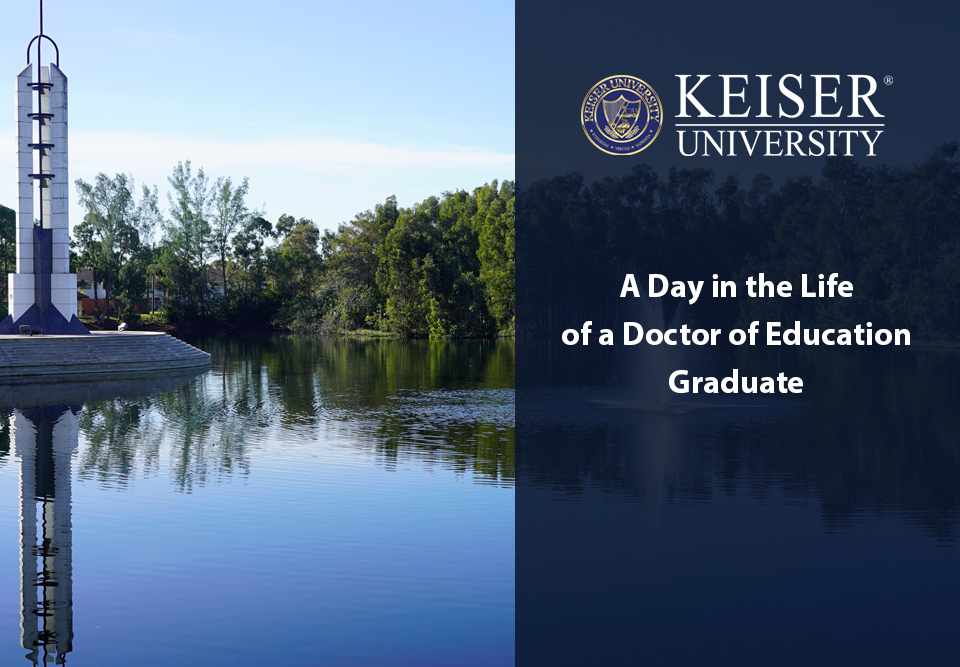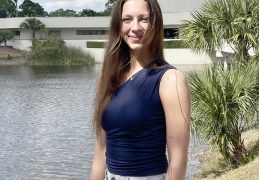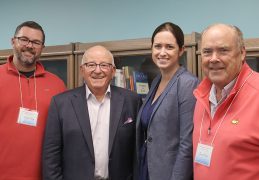Pursuing a Doctor of Education (EdD) is a journey that reshapes careers, deepens expertise, and inspires lifelong growth. No one can attest to this better than the graduates themselves.
Offering a glimpse into their daily lives, challenges and rewards — plus valuable advice for prospective students — the following article shares real-world experiences and candid insights based on interviews with alumni of Keiser University’s online EdD program.
What Is a Doctor of Education Degree?
A Doctor of Education, a doctorate in education, or an EdD, is a terminal degree that equips educational practitioners with advanced leadership, analytical and administrative skills to address real-world challenges in educational settings.
Getting to Know the EdD and Our Graduates
At Keiser University, our EdD program offers two concentrations: Education Leadership and Curriculum Leadership. The curriculum requires the completion of 44 credit hours over 16 courses, typically spanning 24 to 36 months, and encompasses coursework in areas such as:
- Ethical and legal leadership principles
- School safety
- Practical research
- Technology innovation
- Advanced curriculum design
- Professional development
Meet Our Featured EdD Graduates
Without further ado, the alumni we’re showcasing are both graduates of our fully online, virtual EdD program.
Dr. Antonio Green is currently a Dean of Students at KIPP DC Public Schools in Washington, DC, after transitioning from Orlando, Florida. Passionate about educational leadership, Dr. Green aims to become a superintendent leveraging his doctorate degree.
Dr. Brittany McLearran, after also earning her master’s in educational leadership through Keiser, has been teaching seventh and eighth grade English Language Arts and is now actively pursuing leadership roles in K-12 administration and higher education. She emphasizes her passion for preparing future educators and administrators for the real-world challenges of education.
Dr. George Gillispie

Dr. Vestina Oates

Choosing the Right Doctorate Program
Keiser University offers various doctoral programs, including:
- Doctor of Education, EdD
- Educational Leadership, PhD (EdL)
- Curriculum and Instruction, PhD (C&I, Curr)
- Instructional Design and Technology, PhD (IDT)
Initially attracted to instructional technology, Dr. McLearran found her calling within educational leadership. This was largely inspired by supportive faculty and the university’s family-oriented atmosphere with the flexibility of a virtual program that fit perfectly into her daily schedule.
“As a lifelong goal, since I was little, I’ve wanted to have ‘doctor’ in front of my name,” McLearran adds. As soon as she was accepted into the program, she talked to faculty who were integral to pushing guidingher along to pursue a doctorate.
In choosing Keiser, Dr. Green credits its the institution’s students first philosophy and supportive and proactive approach in communicating with prospective students. He appreciated the encouragement from admissions, which solidified his decision. “They stayed on top of me, answered all my questions promptly, and made my transition smooth,” he says.
Aside from saying his doctorate helped him land his current role, Green has also been motivated by his desire to serve as a role model for minority students. “It’s so important to go above and beyond just to be a part of that small percentage of black men with a doctorate degree and to also show students who look like me that you can also get your doctorate,” Green says. “No matter where we come from or the neighborhoods we live in, you also have the right to education. And education is the pathway to success.”
A Day in the Life: Balancing Studies, Work, and Life
A Typical Day: Juggling Responsibilities
Dr. Green vividly remembers balancing full-time educational duties and rigorous doctoral coursework. His daily schedule included managing demanding administrative responsibilities and academic assignments, making for busy days and late nights that sometimes extended well into the morning hours.
“I learned that I have to prioritize my time, so I utilized the weekends to stay up later and the weekdays to get the discussions and different things like that done, because every week, you have multiple assignments,” he says. For students enrolled in just one course, a given week might entail a regular assignment, a rigorous discussion post along with responses, and a weekly paper (which could be up to 20 pages). Green also notes how these assignments all build upon one another to culminate in an overarching paper or project to complete at the end of the class.
Mastering the Art of Balance
When it comes to striking a balance between coursework, professional responsibilities, and personal life, both EdD graduates highlight the critical importance of strong support systems.
Dr. Green credits his success to close connections with his cohort members across the United States, describing them as “family,” supporting each other throughout the program. “I probably could not have done this without them at all,” he says. “That’s how much we support each other — making sure we had the right resources, having each other’s backs so that we all get to the finish line … And we did just that.”
Dr. McLearran echoes this sentiment, reinforcing the importance of professors who understand and encourage students as well as Keiser University’s strong community spirit. For McLearran, life involved balancing teaching, parenting three children, coaching cheerleading, and coordinating after-school programs.
“I would do work after everybody went to sleep, or I would use my planning time during school if I had all my work stuff done. I would just find pockets of time,” she recalls about her daily schedule, also adding, “I had never kept a planner in my entire life until I started this program.” Planning out assignments on a week-by-week proved helpful, as the program gives students all the assignments upfront. “So, finding that time in between balancing real life was just determining, ‘Where can I fit those pockets of time at?’”
Learning and Growth: The Doctoral Experience
Impactful Courses and Mentors
The program curriculum and mentors alike significantly shaped both graduates. Dr. McLearran valued personalized attention from professors, and residency experiences and one-on-one mentorship for shaped shaping her professional identity and clarified clarifying the direction of her doctoral research direction. She specifically mentions Dr. Fuda Daddio, Dr. Rosa and other faculty and staff who inspired her to complete the program.
“At the onset, they make it more like a family. They’re there when you need them. They are understanding,” McLearran says. “Unlike my local college, Keiser’s more personable, and I felt like I got more support from them the way they ran through things.”
In addition to bouncing ideas off one another in roundtable discussions, Dr. McLearran mentions Dr. Gatewood and Dr. Thompson challenging her in a one-on-one setting to help talk through ideas she wouldn’t have realized otherwise. Regarding her research and dissertation, McLearran appreciated “just working together — that camaraderie and that you’re on a level playing field with them. While they may be your instructor, they’re working with you with these new ideas.”
When it comes to the recruitment and admissions process, Dr. Green shouts out Ms. Patricia as being highly encouraging, sincerely believing he could complete the program. “At first, I was doubting myself, like, ‘I don’t know if I could do this; I’m so young,’” says Green, who earned his master’s and doctorate degrees back– to– back. He also notes his first course with Dr. Rosa standing out as impactful in his decision to pursue an advanced degree in the realm of education as a racial minority.
Advice for Future EdD Students
Graduate Tips for Success in an Online EdD Program
Dr. Green recalls advice he received from a professor to the effect of, “If it were easy, then everyone would have a doctorate.” He expands, “Basically, she was like, ‘It is just like the military; only certain people make the cut.’ And that just made me be more resilient and focused.”
As a first-generation graduate, the advice Green has for students is, “Start. If I could do it, you could can do it. I know that sounds so cliché. But I come from poverty, a low-income household, food stamps … Start, because you never know.”
While he initially found it intimidating being the youngest in his courses, having faith in yourself that you can do the work and pushing forward for the sake of your dreams is crucial: “Don’t worry about what anybody else is doing or how far people are ahead of you. Don’t even look at the long-term goal. Just stay in your own lane, and that will get you through the program. Take it one assignment at a time and chunk it down week by week. That way, the overall goal will come to pass.”
Dr. McLearran adds that a colleague witnessed the process she was going through and wondered what it took to earn a doctorate, having always wanted to do it herself. “Then, the day I got conferred, she registered,” McLearran says. “And I told her, ‘It’s going to take a lot out of you, but you have the want and the drive. Nobody else is going to have that for you. Nobody else is going to understand the process. You have to have that want and that discipline to want to do it.’ And she has loved every minute of it so far.”
Overcoming Doctor of Education Program Challenges
Both graduates agree the most significant challenges included the extensive reading and writing required. Dr. Green, in part, credits Keiser’s Writing Studio for helping enhance his academic writing skills — especially for longer papers and during his first semester — and ultimately getting through the program leveraging those skills.
“At first, I was embarrassed, thinking, ‘I’m not going to use a Writing Studio. No way,’” he recounts. Instead, Green found it helped him think of ways to tackle those larger projects through strategic outlining and how to make the best use of each page. Because he couldn’t make it to campus in person, he notes using the online version, where a tutor went over pointers with him in real time.
For Dr. McLearran, a noteworthy challenge was shifting the focus of a dissertation that she was initially passionate about. Having initially started her doctorate with an emphasis in Instructional Design and Technology, she gravitated toward artificial intelligence (AI) topics. “AI is everywhere — my students are using it — and I just wanted to focus on the ethical concerns of it.”
However, after talking with multiple professors, the consensus became that the topic was “so brand-new” and ever-changing that pivoting to a different focus would be best. Despite the shift, though, McLearran says she still incorporated AI technology into her dissertation about using AI alongside response to intervention (RTI), aimed at students who are behind grade levels, to help personalize and individualize instruction.
Final Thoughts: Reflections on the Journey
Dr. Green describes the most rewarding aspect as personal accomplishment and resilience; it was powerful to see how far he’s come after committing to accomplishing this goal for himself. Similarly, Dr. McLearran shares pride in setting an example for her students and family as a first-generation college graduate.
The Rewards of Earning an EdD
Additionally, Dr. McLearran celebrates lifelong friendships formed through her cohort. The same few individuals in her very first graduate class went all the way through the master’s and doctorate programs together. “We talk on a daily basis,” she says. “Those friendships that I made across the country are probably the most rewarding experience. And I feel like even though we’ve only met in person one time, we have a friendship that’s going to last forever, because we bounced ideas off each other.”
Aside from making his family proud, Dr. Green adds, “Sometimes, we don’t ever just say, ‘I’m proud of you.’ I actually looked myself in the mirror and was like, ‘I did this. I’m so proud of myself.’ Just having that moment to just reflect on myself was very eventful for me.”
Future Aspirations and Impact of the EdD
Looking ahead, Dr. Green envisions opening educational programs to support working families and single parents with childcare — whether that’s his own school or daycare within public or charter schools. “A lot of parents struggle with care because they work,” he says. “Everybody doesn’t work in the morning; some parents get off work at 10 or 11 p.m., and the kids just don’t have anywhere to go. So, some of those parents can’t work, or they have to end up quitting or using their days for work.”
Meanwhile, Dr. McLearran aims to transition fully into higher education and administrative roles, dedicated to enhancing education quality and educator preparation.
“Eventually, I want to be a higher ed teacher for future teachers,” she says. “I want to show them what I was not shown in my educational experience. I want them to be more prepared for the workforce. I’m also interested in looking at administration jobs. I’m currently in the process of applying for assistant principal jobs just because I want to get my feet wet and see how that goes.”
Is a Doctorate in Education a Worthwhile Investment?
When presented with the question, “If you could go back in time, would you choose to do it all over again?” both EdD graduates earnestly and unequivocally affirm their decision.
“Absolutely,” Dr. McLearran reflects. “I’ve even considered getting a second doctorate. I found it rewarding.” She’s also found that her own seventh and eighth students could see that she was working hard and, while some of the research was over their heads, they were interested in her sharing what she was working on. “I felt like I was the role model that they needed,” she says.
As for Dr. Green, he asserts, “I’m a determined and goal-oriented person, so if I set a goal, I’m going to do it. I wanted to be the expert in education. And I would definitely go back and would definitely choose Keiser again. I have the best professors, I have the best cohort. I mean, they’re like my family, my friends.”
Take the First Step Toward Your Doctorate in Education Today
Looking to earn your EdD or Doctor of Philosophy (PhD) in education? At Keiser University, we are proud to offer several education doctoral degree programs with varying focuses, including:
- Doctor of Education, EdD — a practitioner-based program to help you take the next step in your career.
- Educational Leadership, PhD (EdL) — a solid step toward leadership and administration roles in K-12 or higher education.
- Curriculum and Instruction, PhD (C&I, Curr) — a way to take charge of educational initiatives in your school district.
- Instructional Design and Technology, PhD (IDT) — a path to improving learning outcomes by implementing impactful multi-media learning experiences.
Get in touch or begin your application today to get started.






 The instructors at Keiser University impacted my life. They believed in my ability to become a great graphic designer, regardless of how I felt about my skills. KU helped to prepare me for the real world and got me to where I am today.
The instructors at Keiser University impacted my life. They believed in my ability to become a great graphic designer, regardless of how I felt about my skills. KU helped to prepare me for the real world and got me to where I am today.
